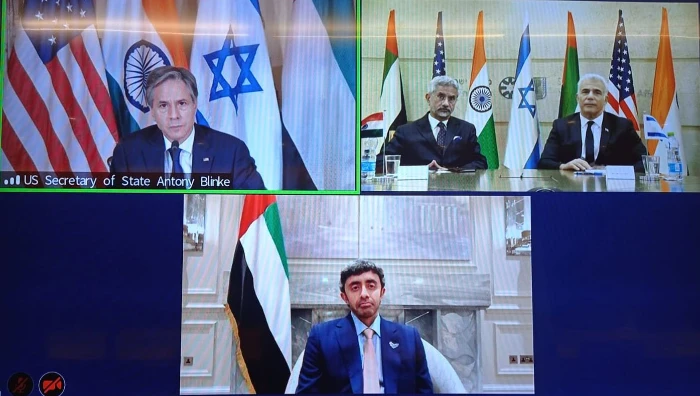In a first, United States Secretary of State Antony Blinken, External Affairs Minister S Jaishankar, Israeli Foreign Minister and Alternate Prime Minister Yair Lapid and UAE Foreign Minister Sheikh Abdullah bin Zayed Al Nahyan got into a virtual huddle Monday night to discuss "shared issues of concern" in the region and globally.
The meeting, which many on social media are even describing as a precursor to possible future formation of a Quad 2.0 alliance, took place during Jaishankar's ongoing visit to Jerusalem. Both Jaishankar and Lapid, who had extensive bilateral talks earlier in the day, sat together during their video interaction with their US and UAE counterparts to discuss future opportunities for collaboration across the region and beyond.
"A fruitful first meeting with Israeli APM and FM Yair Lapid, UAE FM A B Zayed and US Secretary of State Antony Blinken this evening. Discussed working together more closely on economic growth and global issues. Agreed on expeditious follow-up," tweeted Jaishankar late Monday night.
Analysts believe that the new grouping indicates the link up of important US partners in the region to solve problems together and contain the surge of extremism across the region more effectively – from Turkey to Afghanistan
![]() The US State Department said that Blinken and the Foreign Ministers discussed "expanding economic and political cooperation in the Middle East and Asia, including through trade, combating climate change, energy cooperation, and increasing maritime security".
The US State Department said that Blinken and the Foreign Ministers discussed "expanding economic and political cooperation in the Middle East and Asia, including through trade, combating climate change, energy cooperation, and increasing maritime security".
While they also discussed people-to-people ties in technology and science – and how to support global public health in relation to the Covid-19 pandemic – Blinken reiterated the Biden Administration's support for the Abraham Accords and normalization agreements.
India had last year welcomed the signing of agreement in Washington by UAE, Bahrain, Israel and the US, saying that it has always supported peace and stability in West Asia which is an extended neighbourhood.
As New Delhi and Jerusalem cement the bilateral partnership during Jaishankar's visit, India also continues to work closely with the UAE on regional issues of common concern.
Last month, Prime Minister Narendra Modi and Crown Prince of Abu Dhabi Sheikh Mohamed bin Zayed Al had "positively assessed" the continued progress in bilateral cooperation in various areas under the India-UAE comprehensive strategic partnership.
Both leaders had also agreed that there is no place for terrorism and extremism in the world and stressed the importance of international community standing together against such forces.
Washington, meanwhile, has welcomed the warming relations between Israel and the UAE, including the opening of respective embassies, appointment of ambassadors, new direct flights, cultural exchanges, and burgeoning economic and business ties that have benefited the people of both countries and the region.
Last week, in a first of its kind trilateral setting, Blinken had met Lapid and Zayed in Washington to highlight the first anniversary of the Abraham Accords and the normalization agreements between the two nations.
"Secretary Blinken and the Foreign Ministers discussed the importance of increasing joint efforts to combat violent extremism and hate, as well as opportunities to work together to tackle regional security challenges exacerbated by the climate crisis," US State Department spokesperson Ned Price had said in a statement on October 14.
Mohammed Soliman, a non-resident scholar at the Washington-based Middle East Institute, believes that the emerging "multilateral pact" has the potential to transform the region's geopolitics and geoeconomics.
"Last year's normalization agreements between Israel and several Arab states — chief among them, the UAE — along with Turkey's bid to return as the leader of a Muslim order and the growing distance between the UAE and Pakistan have created an unlikely and unprecedented "Indo-Abrahamic" transregional order," Soliman wrote in July.
"The new strategic alignment between New Delhi and Abu Dhabi centers around countering Islamist extremism, defending state sovereignty, and pushing back against the growing influence of the Turkey-led Muslim order," the scholar added.
Also Read: Australia's Morrison dialled Modi before announcing AUKUS security alliance




















